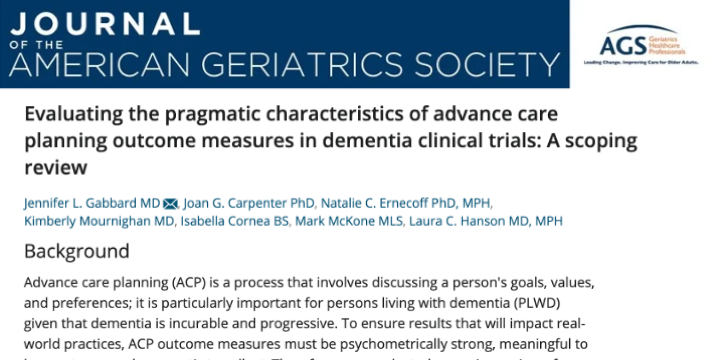July 13, 2023
To ensure that research results will impact real-world practices, ACP outcome measures must be meaningful to key partners, pragmatic, and psychometrically strong. IMPACT members Jennifer Gabbard, MD, Joan Carpenter, PhD, CRNP, ACHPN, Laura Hanson, MD, MPH, authored an article in the Journal of the American Geriatrics Society reviewing the outcome measures used in Advanced Care Planning (ACP) randomized controlled clinical trials (RCTs) for PLWD or their care partners.. This scoping review evaluated 103 outcome measures from 21 ACP RCTs . Results indicated that only 23% of outcome measures were highly pragmatic, reinforcing the need for new pragmatic outcome measures that address the lived experience of PLWD and their care partners for future ePCTs.
Abstract
Background
Advance care planning (ACP) is a process that involves discussing a person’s goals, values, and preferences; it is particularly important for persons living with dementia (PLWD) given that dementia is incurable and progressive. To ensure results that will impact real-world practices, ACP outcome measures must be psychometrically strong, meaningful to key partners, and pragmatic to collect. Therefore, the authors conducted a scoping review of outcome measures utilized in ACP randomized controlled clinical trials (RCTs) enrolling PLWD or their care partners and evaluated their pragmatic characteristics.
Methods
The authors searched MEDLINE/PubMed, EMBASE, CINAHL, PsycINFO, and Web of Science for peer-reviewed ACP RCTs enrolling PLWD or their care partners from 2011 to 2021. They abstracted characteristics of primary and secondary outcome measures, including pragmatic characteristics using an adapted Psychometric and Pragmatic Evidence Rating Scale and ACP outcome domains using the standardized ACP Outcome Framework (i.e., process, action, healthcare, or quality of care).
Results
Authors included 21 ACP RCTs. Trials included 103 outcome measures (39 primary and 64 secondary), of which 11% measured process, 14% measured action, 49% measured healthcare, and 26% measured quality of care. Twenty-four (23%) outcome measures were highly pragmatic, the majority of which (67%) reflected healthcare outcome measures. Sixty-one (59%) outcomes were assessed as highly relevant to PLWD or their care partners. Only 20% (n = 21) of outcome measures were embedded into clinical practice. Most (62%) RCTs were conducted in nursing homes, and 33% were focused PLWD with advanced stage disease.
Conclusions
In RCTs testing ACP interventions to support PLWD, only 23% of outcome measures were highly pragmatic, and most of these measured healthcare utilizations. Outcome assessments were rarely integrated into the EHR during routine clinical care. New outcome measures that address the lived experience of PLWD and their care partners plus have high pragmatic characteristics are needed for embedded pragmatic clinical trials.



